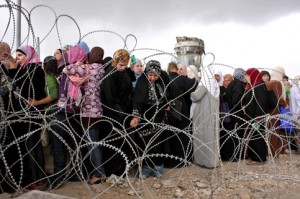Another trip through Qalandiya
I live in Ramallah. This morning I had to go to East Jerusalem for a meeting. I took the number 18 bus from the central bus station and it took the usual 15 minutes or so to get to the Qalandiya checkpoint, the main access point for Palestinians between Ramallah and occupied East Jerusalem. Only Palestinians with Jerusalem identification cards or with permits to enter Jerusalem can pass. As a foreigner with a visa I usually have no problems. At Qalandiya, we walk to the checkpoint terminal. We pass through a narrow caged tunnel and then through the first turnstile. Now I have to choose a queue to wait in. This can be the difference between 20 minutes or over an hour. They all look the same today so I just join a queue and wait in line while the Israeli soldiers allow a few people at a time to pass. I watch and wait as the people in front of me click through the turnstile one by one, into the enclosed area where the soldiers sit behind glass and check every ID. I see them taking off coats and belts to pass under an airport type scanner before showing their ID. Every so often, someone is turned back and has to walk back through the turnstile and through the queue of people back to Ramallah. There is quiet chatter in the line disrupted by the occasional disembodied voice in Hebrew coming through a loudspeaker from the Israeli soldiers shouting an order at someone.
After 30 minutes or so I am near the front of the line. A woman in front of me with two children and a buggy is trying to persuade the soldiers to open the gate so she can wheel her youngest child through. Nothing happens so she gives up trying. The older child carries her younger sister; the mother carries the pushchair. The children get through first. The soldiers stop the turnstile and they are stranded on their own. The mother is stuck half way between. I want to say something but there is no-one to say anything to. The soldiers aren’t buzzing the turnstile on to let her through. People start shouting out in Arabic ‘walad, walad’ – ‘children, children’ in case the soldiers haven’t seen the children are stuck on their own. Eventually the mother gets through the turnstile and I breathe a sigh of relief.
It’s my turn. I show the young Israeli soldiers behind the glass my passport with my picture and my visa. They nod me through. I am heading towards the next turnstile to exit when they call me back. ‘What’s in your bag?’ I tell them it’s just books and get one out to show them. They wave me through. I am taking through copies of a report I’ve just finished writing with a women’s organization in Ramallah called the Women’s Centre for Legal Aid and Counselling. The report is called ‘Palestinian Women’s Voices: A 2009 report on Israel’s human rights violations against Palestinian women.’
I hate this trip through Qalandiya, it is dehumanizing and the casual mistreatment, humiliation and frankly just the rudeness upsets me. But I remind myself that this is nothing, at least I can travel around. The night before I went to a meeting in Ramallah arranged by the Carter Centre and the Right to Enter Campaign. Two women originally from Gaza spoke to the meeting. One of them described how since she moved to Ramallah in 2006 for work – she is a civil engineer – she has not been able to return to Gaza to see her mother and brothers. Her mother now has cancer and she cannot visit her unless she commits to returning to Gaza indefinitely. Meanwhile, as a Palestinian woman with a Gaza ID card she cannot travel even outside Ramallah. If she went through a checkpoint and showed her ID, she would be arrested and deported to Gaza. She feels like a criminal, imprisoned in the city of Ramallah because of the words ‘Khan Younis’ on her ID card. She had tears in her eyes as she described her life and the choice between life with her job, friends and sisters in Ramallah and her mother in Gaza. All Gazans living in the West Bank face these dilemmas, even if they are allowed to reside in the West Bank: a colleague from my office in Ramallah who is originally from Gaza told me how she was not given a permit to go back to Gaza for her father’s funeral.
Working here I have seen daily that the occupation is not only about the dramatic stories that you see on the news – the assassinations; the bombs; the arrests and incursions. It is also about the every day stories of humiliation, desperation and sadness that result from the denial of basic rights and restrictions on the freedoms we take for granted.
Machsomwatch’s Neta Efroni film of people trying to pass through Qalandiya January 2008:
Hannah Brooks currently works on women’s rights projects in Jerusalem and the West Bank. In 2004 she spent three months in Israel/Palestine with the Ecumenical Accompaniment Programme in Palestine and Israel (EAPPI) and in 2006 she worked in Ramallah, Nablus and Hebron with Palestinian lawyers on behalf of the Bar Human Rights Committee. She has also worked on human rights issues and projects in Nepal and Turkey.

